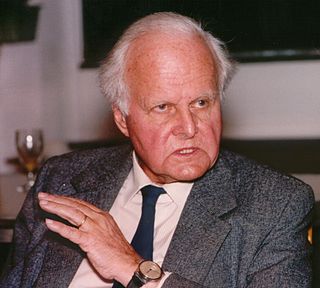A Quote by Henri Poincare
Einstein does not remain attached to the classical principles, and when presented with a problem in physics he quickly envisages all of its possibilities. This leads immediately in his mind to the prediction of new phenomena which may one day be verified by experiment.
Related Quotes
Einstein and the Quantum is delightful to read, with numerous historical details that were new to me and cham1ing vignettes of Einstein and his colleagues. By avoiding mathematics, Stone makes his book accessible to general readers, but even physicists who are well versed in Einstein and his physics are likely to find new insights into the most remarkable mind of the modern era.
The hypotheses which we accept ought to explain phenomena which we have observed. But they ought to do more than this; our hypotheses ought to foretell phenomena which have not yet been observed; ... because if the rule prevails, it includes all cases; and will determine them all, if we can only calculate its real consequences. Hence it will predict the results of new combinations, as well as explain the appearances which have occurred in old ones. And that it does this with certainty and correctness, is one mode in which the hypothesis is to be verified as right and useful.
The phenomena in these exhausted tubes reveal to physical science a new world-a world where matter may exist in a fourth state, where the corpuscular theory of light may be true, and where light does not always move in straight lines, but where we can never enter, and with which we must be content to observe and experiment from the outside.
Quantum physics is the physics of possibilities. And not just material possibilities, but also possibilities of meaning, of feeling, and of intuiting. You choose everything you experience from these possibilities, so quantum physics is a way of understanding your life as one long series of choices that are in themselves the ultimate acts of creativity.
Modern man lives isolated in his artificial environment, not because the artificial is evil as such, but because of his lack of comprehension of the forces which make it work- of the principles which relate his gadgets to the forces of nature, to the universal order. It is not central heating which makes his existence 'unnatural,' but his refusal to take an interest in the principles behind it. By being entirely dependent on science, yet closing his mind to it, he leads the life of an urban barbarian.
Science works because the phenomenon being described can be relied on to remain the same. Even in quantum physics, where phenomena are changed by observation, the way in which observation interferes is regular and falls within a limited range of possibilities. Human culture, however, has the nasty habit of never staying the same for very long.
Einstein had two new predictions from general relativity. One was that light would bend. That was tested in 1919, and basically, he was proven right. The second prediction was gravitational waves, which took us 100 years to prove. The theory itself, which is thought by most to be rather obscure, you use every day, probably.
Satan frequently steals the will of God from us due to reasoning. The Lord may direct us to do a certain thing, but if it does not make sense - if it is not logical - we may be tempted to disregard it. What God leads a person to do does not always make logical sense to his mind. His spirit may affirm it and His mind reject it, especially if it would be out of the ordinary or unpleasant or if it would require personal sacrifice or discomfort.
A. Douglas Stone, a physicist who has spent his life using quantum mechanics to explore striking new phenomena, has turned his considerable writing skills to thinking about Einstein and the quantum. What he finds and makes broadly understandable are the riches of Einstein's thinking not about relativity, not about his arguments with Bohr, but about Einstein's deep insights into the quantum world, insights that Stone shows speak to us now with all the vividness and depth they had a century ago. This is a fascinating book, lively, engaging, and strong in physical intuition.
The experimental investigation by which Ampere established the law of the mechanical action between electric currents is one of the most brilliant achievements in science. The whole, theory and experiment, seems as if it had leaped, full grown and full armed, from the brain of the 'Newton of Electricity'. It is perfect in form, and unassailable in accuracy, and it is summed up in a formula from which all the phenomena may be deduced, and which must always remain the cardinal formula of electro-dynamics.






































